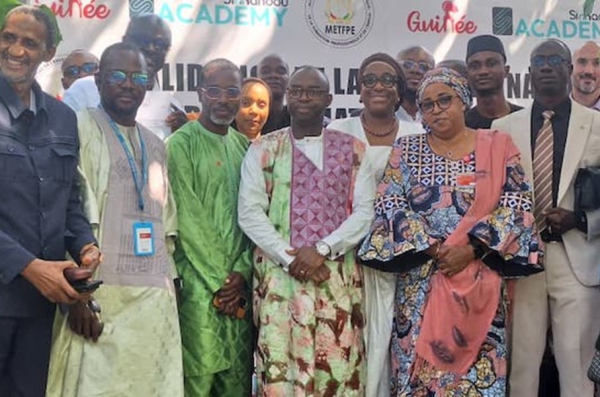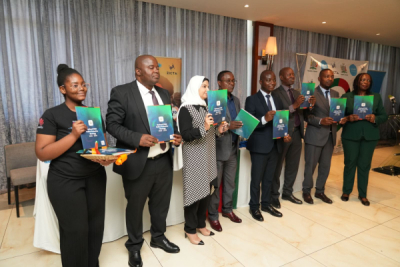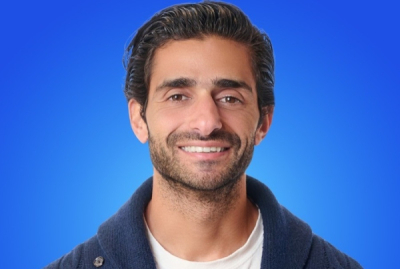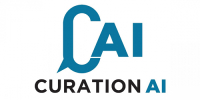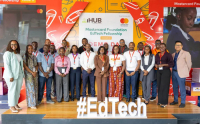-
E-Doc Online, founded in 2021, provides an open-banking data gateway that connects— with user consent— to bank accounts and transaction histories in real time.
-
The company’s API automates identity verification, credit decisions and compliance, using AI and large language models to classify unstructured banking data.
-
The system aims to strengthen risk scoring, reduce document fraud and accelerate onboarding and lending for B2B financial institutions.
Tunde Ogundipe links banking data to risk evaluation and reshapes how financial actors operate. He redefines the use of information in credit decisions and the monitoring of financial services.
Tunde Ogundipe is a Nigerian financier and entrepreneur. He co-founded E-Doc Online and serves as its CEO. The UK-based company specializes in accessing and structuring financial data. It operates in Nigeria and provides a banking-data gateway for B2B institutions.
E-Doc Online, founded in 2021, develops data infrastructure based on open-banking principles. The technology connects— with user consent— to customers’ bank accounts and transaction histories. The platform then structures the data and delivers it to financial institutions and enterprises that need stronger customer insights and real-time risk evaluation.
The platform relies on an application programming interface (API) that automates identity verification and credit decisions. The API collects user consent, pulls real-time banking data and transmits it in a usable format to partner systems.
The system integrates artificial-intelligence models, including large language models that analyze transaction descriptions. These models interpret and classify unstructured data. The method strengthens risk-score accuracy, reduces attempts at document falsification and accelerates onboarding, loan approvals and compliance checks.
Before founding E-Doc Online, Ogundipe launched Kolobox in 2018. The application enables users to invest savings through a digital wallet funded automatically from a debit card at a defined frequency to help them meet financial goals.
Ogundipe holds a bachelor’s degree in accounting from Kennesaw State University in the United States and a management diploma obtained in 2006 from the Georgia Institute of Technology. He started his career in 2001 at Cingular as a senior IT accountant.
He joined Verizon in 2003 as a financial analyst. He later worked as a business analyst at Metro Bank in London from 2016 to 2019, and as an analyst at Bank of America Merrill Lynch in Ireland between 2020 and 2024.
This article was initially published in French by Melchior Koba
Adapted in English by Ange Jason Quenum
- Strategy targets curriculum reform, teacher skills, infrastructure and online learning tools
- Strategy aligns with SDG 4 and aims to boost youth employment and digital readiness
Guinea has approved its National Strategy for the Digital Transformation of Technical and Vocational Education and Training. The 300 billion Guinean franc (34.5 million dollar) plan was adopted at a workshop in Conakry hosted by the Ministry of Technical Education and Vocational Training. It aims to modernize the country’s technical and vocational training system.
The strategy is aligned with the Sustainable Development Goals, particularly SDG 4 on quality education. It seeks to make technical education a key driver of employment and entrepreneurship. Its priorities include updating training programs, adapting curricula to labor market needs, improving digital infrastructure and connectivity, and closing the skills gap among teachers.
According to the ministry, the funding will be used to strengthen digital infrastructure, equip training institutions, train teachers and deploy online learning platforms. The plan forms part of Guinea’s 2035 development vision, which aims to build a strong digital ecosystem that can support technical education over the long term. Regionally, Guinea is contributing to a pan-African initiative to digitize technical education in order to align approaches and share funding and expertise across countries.
The approval comes as Africa’s labor market is rapidly changing with rising demand for digital skills. The Brookings Institution’s report “Foresight Africa 2025-2030” estimates that 230 million jobs in sub-Saharan Africa will require digital competencies by 2030. It also anticipates up to 650 million training opportunities, which represent a potential market of 130 billion dollars.
The successful implementation of Guinea’s strategy will depend on several factors. These include securing the necessary funding, strengthening governance, improving teacher training in digital tools and ensuring the availability of essential infrastructure such as reliable electricity and high-speed internet in rural areas.
If fully implemented, the strategy could expand access to professional training, modernize technical programs, increase youth employability and strengthen the country’s competitiveness in a rapidly digitalizing economy. Youth unemployment remains particularly high in Guinea and is estimated at nearly 60 percent according to national statistics.
Samira Njoya
- Government launches a 2025–2029 national child online protection strategy with a $1.8 million budget.
- UNICEF and GSMA created the Africa Taskforce on Child Online Protection in October 2025 to harmonize continental standards.
- Zambia joins Nigeria and Ghana, which already adopted national policies on child cybersecurity.
Zambia has introduced a national strategy to protect children online as digital adoption accelerates amo
ng the country’s youth. The government aims to ensure safer and more responsible Internet access for minors.
The government launched the National Child Online Protection Strategy (2025–2029) on Monday, November 24. The document sets a roadmap to strengthen digital safety for children nationwide and to build a safer online environment for young users.
The government allocated $1.8 million to this plan. The strategy focuses on several pillars, including strengthened national policy coordination, development of digital skills, awareness programs for children and parents, and a structured collaboration framework connecting public, private and civil society stakeholders.
This initiative comes as Internet penetration grows quickly across Africa, especially among younger populations. UNICEF reports that African children rank among the fastest-growing digital user groups worldwide, which increases their exposure to cyberbullying, misinformation, online exploitation and harmful content.
These risks prompted UNICEF and GSMA in October 2025 to launch the Africa Taskforce on Child Online Protection (COP). The platform aims to harmonize protection efforts, deepen cooperation among states and promote shared digital safety standards across the continent.
In Zambia, recent national data on children’s Internet use remains limited. Authorities, however, recognize a steady rise in youth connectivity, which makes preventive, educational and regulatory measures urgent.
With this strategy, Zambia joins other African countries that have already implemented structured national child online safety policies. Nigeria and Ghana in recent years adopted legal frameworks and government programs dedicated to child cybersecurity.
If fully implemented, Zambia’s strategy could reduce minors’ exposure to digital risks and strengthen trust among families and schools in the use of online tools. Its success, however, will also depend on the development of an adapted legislative framework to ensure a safe, inclusive and protective digital environment for children.
Samira Njoya
- Edomatch records more than 50,000 downloads on Android.
- The start-up launched the platform in 2024 in Lomé.
- The app enables direct job applications and employer preselection through a single mobile interface.
Edomatch disrupts traditional recruitment in Togo by offering employers and job seekers a mobile platform designed to simplify hiring. The application aims to provide a fast, accessible and low-cost solution for both sides of the labor market.
Edomatch is a digital tool that allows any job seeker—whether full-time, part-time or for temporary assignments—to apply online through its website or mobile app. The Lomé-based start-up launched the service in 2024 under the leadership of founder Chris Koehler.
“Our mission is to simplify and humanize the job search while helping companies find talent efficiently,” the start-up states. The application runs on iOS and Android, and it has already surpassed 50,000 downloads on the Play Store.
The platform enables users to create profiles, review available offers and apply in a few clicks. Companies can publish job postings and preselect candidates directly from the app. This structure reduces administrative steps and accelerates recruitment processes.
Edomatch differentiates itself through its broad sector coverage, which includes commerce, logistics, services, construction and hospitality. The app uses geolocation tools that allow candidates to identify job postings near their homes. This feature supports local employability and reduces unnecessary travel.
The platform also facilitates professional integration for young people, inexperienced candidates and individuals from disadvantaged backgrounds. For companies, the application reduces time and resource costs by eliminating the need to publish across multiple channels, sort large volumes of CVs or rely on expensive intermediaries. Firms can quickly identify relevant profiles and access candidates available for immediate hire.
By combining an accessible mobile interface, a large pool of job listings and an inclusive orientation, Edomatch has the potential to transform Togo’s labor market. In an economy marked by informality and high unemployment, the platform could become a key tool for professional integration by making recruitment more transparent, efficient and equitable.
This article was initially published in French by Adoni Conrad Quenum
Adapted in English by Ange Jason Quenum
- Bluworks raises $1 million to expand in the Middle East and North Africa.
- The platform centralizes scheduling, attendance, administration and payroll into one system.
- Founder Hussein Wahdan previously held senior planning and performance roles at Jumia Egypt.
Hussein Wahdan targets a sensitive operational challenge inside companies: team organization and the management of employee-related data. His solution aims to meet a growing demand for structure and visibility in workforce administration.
Wahdan is an Egyptian tech entrepreneur and the chief executive of Bluworks, a human-resources technology start-up he founded in 2022 with COO Farah Osman. The company recently raised $1 million to scale across the Middle East and North Africa.
Bluworks operates an online platform that manages HR functions for organizations with large workforces or variable schedules. The tool unifies scheduling, attendance tracking, administrative management and payroll processing in one environment. The company intends to reduce manual workloads and centralize all employee-related data.
The scheduling function enables managers to create and adjust team timetables and to share them without external spreadsheets or scattered updates. The system updates schedules in real time, which limits gaps between instructions and on-site execution.
The real-time attendance module shows who is working, who is missing and who arrives outside expected hours. The platform uses these data points to calculate hours, leave and payroll. The leave module automates requests, approvals and validation workflows, which gives managers a consolidated view of available staff.
The platform also includes a system for bonuses and penalties and a digital HR file for each employee. These tools aim to structure information, avoid double entries and improve operational clarity. The payroll engine connects to all other modules and automatically calculates monthly salaries using recorded data.
Wahdan’s professional path informs Bluworks’ direction. He earned an economics degree in 2010 from the American University in Cairo and an MBA in 2018 from IE Business School in Spain.
He began his career in 2010 as a corporate banking associate at CIB Egypt before joining Jumia Egypt from 2018 to 2022. He first worked as a business planning manager and later became head of planning and performance in 2020.
This article was initially published in French by Melchior Koba
Adapted in English by Ange Jason Quenum
At the BimaLab Africa Insurtech Summit, held on Wednesday, November 26 and Thursday, November 27 in Nairobi, FSD Africa announced the creation of the Inclusive Insurtech Investment Fund. This $30 million venture capital fund is dedicated to supporting early-stage African insurance technology (insurtech) startups. Building on the BimaLab program, this funding vehicle will back solutions designed to improve the accessibility, affordability, and relevance of insurance, particularly in the areas of climate, health, and financial inclusion for underserved populations.
Nigerian entrepreneur Kayode Aladesuyi’s company, MYai Robotics, has unveiled Curation AI, a system that verifies articles, images, videos, audio and social media posts in seconds while also tracking public opinion in real time. Developed by a mostly Nigerian team, the tool is designed to curb misinformation by enabling the public, media outlets and institutions to quickly verify digital content.
Twelve Kenyan startups – including LeadNow by Dignitas, Cloud School System, Elimu Shop, iFunza, M-Lugha Technologies, Nyansapo AI, Zydii and Digifunzi– have completed the third cohort of the Mastercard Foundation EdTech Fellowship. During the six-month program, they received support to refine their solutions and expand the rollout of digital tools that promote inclusive education.
-
Google.org will provide $1.5 million to fund a digital literacy and online-safety programme across four African countries.
-
JA Africa aims to train 250,000 children, 6,000 teachers and 8,000 parents and caregivers by 2027.
-
The programme will deploy Google’s “Be Internet Awesome” curriculum, including Interland, through schools and community networks.
Children in Africa gain access to digital technology at increasingly early ages as connectivity expands across the continent. This rapid exposure, however, brings major risks such as cyberbullying, harassment and exploitation, which compel governments and organisations to strengthen online-safety protections.
JA Africa, the regional arm of one of the world’s oldest youth-focused economic-education organisations, announced on 26 November the launch of a digital-literacy and online-safety programme in Ghana, Kenya, Nigeria and South Africa. The initiative uses $1.5 million in funding from Google.org, the philanthropic arm of Google, and targets the training of 250,000 children, 6,000 teachers and 8,000 parents and caregivers by 2027 to reinforce child safety in a fast-growing digital ecosystem.
“Digital connectivity now forms the backbone of modern life in Africa, and our children must be equipped not only to participate but also to stay protected,” JA Africa CEO Simi Nwogugu said. “With support from Google.org, we help young people turn access into opportunity by building a generation of smart, safe and respectful digital citizens.”
The programme relies on Google’s “Be Internet Awesome” curriculum, which teaches digital security, privacy protection, anti-cyberbullying practices and responsible online citizenship. The curriculum uses Interland, a game-based platform, to engage young learners. JA Africa will deploy the programme through school workshops, teacher-training sessions and community-based activities, including in underserved rural areas. The initiative aligns with existing national frameworks on child protection and ICT-in-education policies in Ghana, Nigeria and Kenya.
The launch comes as minors face rising digital-exposure risks across Africa. GSMA data shows that 18% of children aged 5 to 7 in sub-Saharan Africa already use mobile Internet. The International Telecommunication Union estimates that one child connects to the Internet every half-second worldwide, highlighting the accelerating pace of early digital access. Yet, in 2024, only 39 African countries had completed a national online-child-protection strategy, while 32% were still drafting one and 41% had taken no formal steps.
The project could ultimately support the creation of common continental standards for online child protection through planned collaboration with education, ICT and communications ministries. JA Africa and Google intend to amplify the programme with awareness campaigns, digital-content production and key events, including Safer Internet Day 2026, to broaden public reach.
This article was initially published in French by Samira Njoya
Adapted in English by Ange Jason Quenum
-
Fadila Ménage provides more than 150 trained domestic employees with a 97% client satisfaction rate and a 24-hour response time.
-
The platform, created in 2017 by Loukman Lamany, offers both placement and professional cleaning services for households and companies.
-
The company uses a structured recruitment process with training and background checks to guarantee reliability and service quality.
In Togo, Fadila Ménage positions itself as a leading provider connecting households or companies with professional domestic workers. Fadila Group developed this digital solution to specialise in the placement of housekeepers, nannies, cooks, drivers and cleaning agents while also offering professional cleaning services for homes and offices. Loukman Lamany founded the company in 2017.
The company operates a platform accessible through its website that allows clients to request quotes, hire qualified personnel or book one-off cleaning services. It claims to employ more than 150 workers trained according to its methods, to maintain a 97% client satisfaction rate and to provide an average 24-hour response time. These features make the platform a credible and structured alternative to informal solutions that remain widespread in the region.
Fadila Ménage builds its strength on a selection process that includes training and background checks to ensure reliable staff. “We recruit judiciously and provide technical training to our agents to offer households and institutions in Togo the best quality services in industrial, commercial and residential cleaning and maintenance,” the startup said.
The company provides modular services, including occasional or regular cleaning, full-time or part-time employment, and related services such as office cleaning. Beyond on-demand services, the company highlights its social commitment by promoting the professional integration of young people, unskilled women, unemployed individuals and seniors, thereby reducing unemployment and supporting economic inclusion.
The solution responds to a growing demand for reliable domestic services. Fadila Ménage delivers a professional, transparent and structured model that has the potential to transform the personal-services market in Togo.
This article was initially published in French by Adoni Conrad Quenum
Adapted in English by Ange Jason Quenum
More...
- BankerX uses AI-driven tools and media to expand financial inclusion across emerging markets.
- The company’s podcasts rank highly on Apple Podcasts and Spotify among young professionals.
- BankerX GPT supports financial decision-making with a focus on emerging-market users.
Koshiek Karan develops digital tools to reshape how people learn, use, and move money. He aims to open new paths for understanding, investing, and acting within the modern economy.
Karan, a former South African investment banker, now works as a financial content creator and serial entrepreneur. He founded several companies at the intersection of fintech, media, and wellness. He currently leads BankerX, a media and technology business.
BankerX, founded in 2020, positions itself as a hybrid platform combining financial media and technology. The company seeks to expand access to investing, saving, and money management. It relies on artificial intelligence, digital tools, and cross-border communities to support this goal. BankerX builds its offering around financial education, digital content, investor networks, and learning hubs.
The company defines financial inclusion and long-term wealth creation as its core mission, particularly for global audiences in Africa and other emerging markets. It blends AI, digital media, fintech tools, and human networks to help users understand money, invest, and build wealth over time.
BankerX produces content covering personal finance, markets, business, and macro-economy topics. Its podcasts rank high on Apple Podcasts and Spotify, with a strong following among young professionals and entrepreneurs.
BankerX also maintains an active presence on social media and its website. It publishes market news, analysis, and open educational resources on investing. The company designs its content to encourage immediate practical application.
The firm develops several technology projects, including BankerX GPT. The tool guides financial decision-making and supports operational tasks in finance, with a particular focus on emerging markets. It helps users analyse financial products, test scenarios, and clarify choices.
Alongside BankerX, Karan co-founded multiple companies. In 2021, he launched AltVest Capital, where he served as executive chairman until 2023. That same year, he created WealthX, an educational platform; RAX Wealth, a wealth-management technology firm; and Flex Fitness, an international wellness community.
Karan holds a finance degree from the University of Cape Town, awarded in 2012. He began his career in 2013 as an investment banking analyst at Barclays Investment Bank. In 2020, he joined Barloworld as a transaction adviser.
This article was initially published in French by Melchior Koba
Adapted in English by Ange Jason Quenum
-
Crowdyvest, created in 2019, combines saving, investing and payment management in a single digital platform.
-
The platform automates deposits, offers curated investment opportunities and provides a digital wallet for bill settlement and transactions.
-
CEO Temitope Omotolani previously helped launch Farmcrowdy and brings a strong background in economics and agribusiness.
Temitope Omotolani, a Nigerian entrepreneur and trained economist, develops a user-centred financial model that creates a new framework for organising personal capital. Her project introduces a notable shift in everyday money management.
Omotolani serves as cofounder and chief executive officer of Crowdyvest, an online platform that provides savings and investment tools to the general public.
Crowdyvest, created in 2019, brings savings, investment and payment management together in one ecosystem. The platform offers interactive products and a catalogue of curated investment opportunities. Users define their financial goals, set their contribution rhythm and manage their budgets through a personal dashboard. The system aims to help individuals progressively strengthen their financial stability and anticipate future uncertainties.
Savings form the core of the platform. Crowdyvest integrates automation and digital tracking to encourage consistent deposits and simplify their management. The company presents its savings products with annual interest rates advertised as attractive. Alongside these options, the Crowdyvest Yield section gives users access to impact-oriented investments across several sectors, with short- or long-term horizons depending on the saver’s profile and objectives.
The platform also includes a bill-payment and transaction service supported by a digital wallet. It enables members to track expenses, meet payment deadlines and conduct routine transactions. Crowdyvest expands this ecosystem through negotiated partner offers that provide discounts and preferential conditions on selected financial products, thereby supporting users beyond simple capital allocation.
Before launching Crowdyvest, Omotolani helped create Farmcrowdy in 2016, a company specialising in technologies applied to agricultural production. She served as vice president of operations and later as chief operating officer until 2019.
Omotolani holds a bachelor’s degree in economics earned in 2017 from the University of Lagos. She also completed training in agricultural business and management at the Lagos Business School of the Pan-Atlantic University.
This article was initially published in French by Melchior Koba
Adapted in English by Ange Jason Quenum
Nigeria’s Task Systems Limited has won the Microsoft Partner of the Year Award, beating more than 4,000 candidates from over 100 countries. The award highlights decades of expertise in deploying digital solutions for major African enterprises and reinforces Task Systems’ position as a key driver of digital transformation on the continent.
Proparco is investing in Kenyan e-mobility startup BasiGo, which assembles electric buses locally and finances them through a pay-as-you-drive model. The funding will help the company expand its operations in Kenya and Rwanda, strengthen its charging network, and move closer to its goal of deploying 1,000 buses.



